Serving 687 students in grades 5-6, Martha Vinyard Elementary School ranks in the bottom 50% of all schools in Louisiana for overall test scores (math proficiency is bottom 50%, and reading proficiency is bottom 50%).
The percentage of students achieving proficiency in math is 21% (which is lower than the Louisiana state average of 32%). The percentage of students achieving proficiency in reading/language arts is 30% (which is lower than the Louisiana state average of 42%).
The student:teacher ratio of 21:1 is higher than the Louisiana state level of 14:1.
Minority enrollment is 55% of the student body (majority Black), which is lower than the Louisiana state average of 59% (majority Black).
Quick Stats (2025)
- Grades: 5-6
- Enrollment: 687 students
- Student:Teacher Ratio: 21:1
- Minority Enrollment: 55%
- Overall Testing Rank: Bottom 50% in LA
- Math Proficiency: 21% (Btm 50%)
- Reading Proficiency: 30% (Btm 50%)
- Science Proficiency: 21% (Btm 50%)
- Source: National Center for Education Statistics (NCES), LA Dept. of Education
Top Rankings
Martha Vinyard Elementary School ranks among the top 20% of public schools in Louisiana for:
Category
Attribute
Diversity
School Overview
Martha Vinyard Elementary School's student population of 687 students has declined by 7% over five school years.
The teacher population of 32 teachers has grown by 10% over five school years.
Grades Offered
Grades 5-6
Total Students
687 students
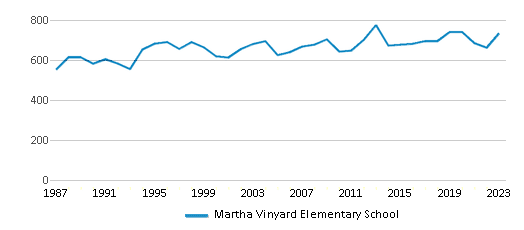
Gender %
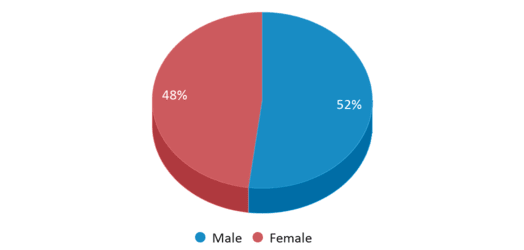
Total Classroom Teachers
32 teachers
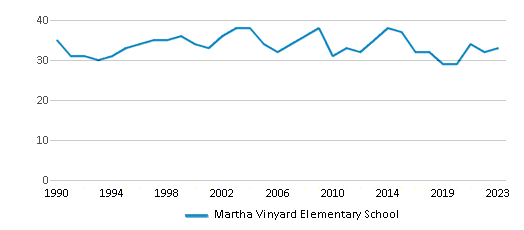
Students by Grade
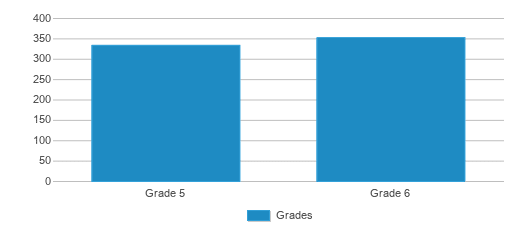
School Rankings
Martha Vinyard Elementary School ranks within the bottom 50% of all 1,251 schools in Louisiana (based off of combined math and reading proficiency testing data).
The diversity score of Martha Vinyard Elementary School is 0.64, which is less than the diversity score at state average of 0.65. The school's diversity has stayed relatively flat over five school years.
Overall Testing Rank
#835 out of 1251 schools
(Bottom 50%)
(Bottom 50%)
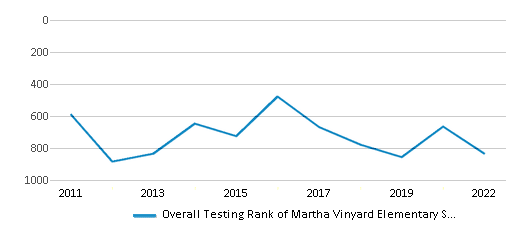
Math Test Scores (% Proficient)
21%
32%
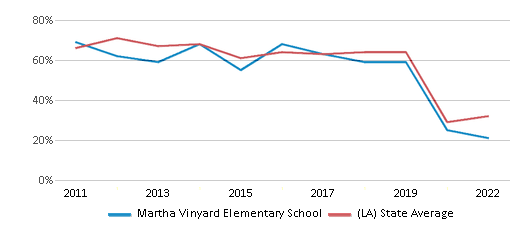
Reading/Language Arts Test Scores (% Proficient)
30%
42%
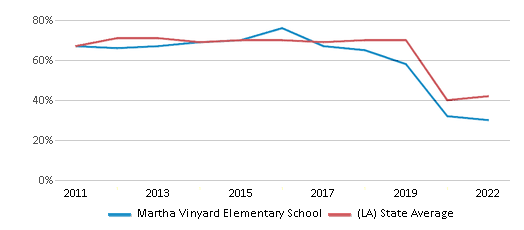
Science Test Scores (% Proficient)
21%
27%
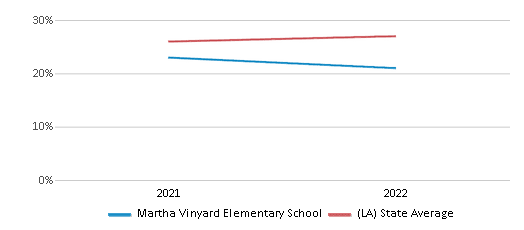
Student : Teacher Ratio
21:1
14:1
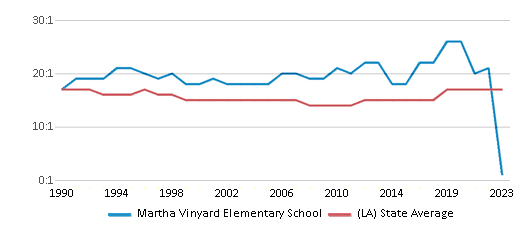
American Indian
n/a
1%
Asian
1%
2%
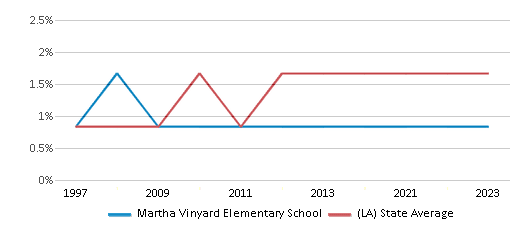
Hispanic
11%
11%
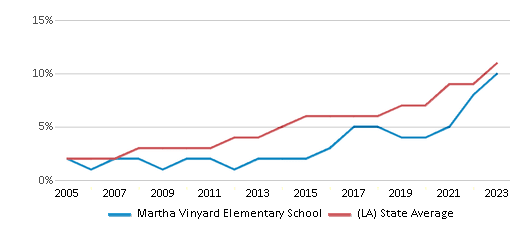
Black
38%
41%
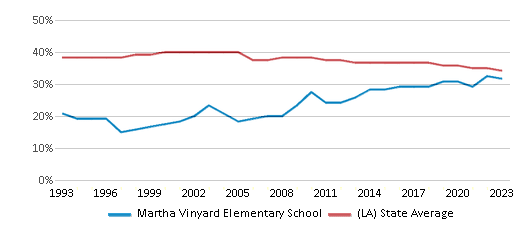
White
45%
41%
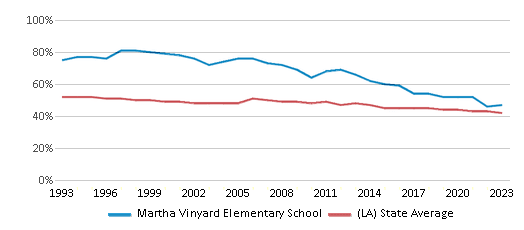
Hawaiian
n/a
n/a
Two or more races
5%
4%
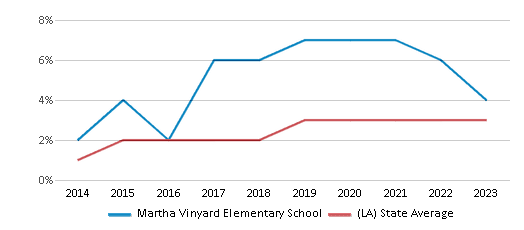
All Ethnic Groups
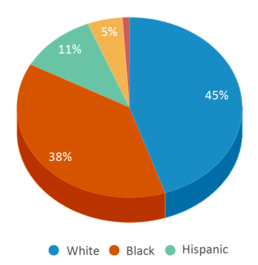
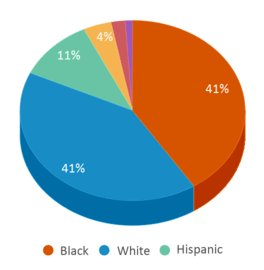
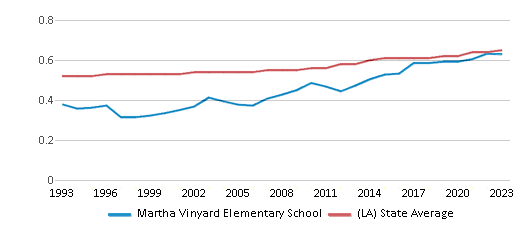
Participates in the National School Lunch Program (NSLP)
Yes
Eligible for Free Lunch
56%
57%
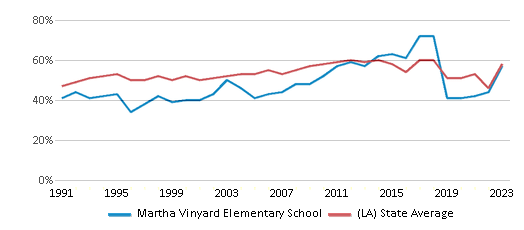
Eligible for Reduced Lunch
6%
5%
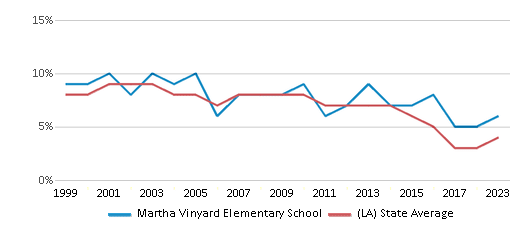
School Statewide Testing
School District Name
Source: National Center for Education Statistics (NCES), LA Dept. of Education
Profile last updated: 02/09/2025
Frequently Asked Questions
What is Martha Vinyard Elementary School's ranking?
Martha Vinyard Elementary School is ranked #835 out of 1,251 schools, which ranks it among the bottom 50% of public schools in Louisiana.
What schools are Martha Vinyard Elementary School often compared to?
Martha Vinyard Elementary Schoolis often viewed alongside schools like D.c. Reeves Elementary School, Southeastern La University Lab School, Champ Cooper Elementary School by visitors of our site.
What percent of students have achieved state testing proficiency in math and reading?
21% of students have achieved math proficiency (compared to the 32% LA state average), while 30% of students have achieved reading proficiency (compared to the 42% LA state average).
How many students attend Martha Vinyard Elementary School?
687 students attend Martha Vinyard Elementary School.
What is the racial composition of the student body?
45% of Martha Vinyard Elementary School students are White, 38% of students are Black, 11% of students are Hispanic, 5% of students are Two or more races, and 1% of students are Asian.
What is the student:teacher ratio of Martha Vinyard Elementary School?
Martha Vinyard Elementary School has a student ration of 21:1, which is higher than the Louisiana state average of 14:1.
What grades does Martha Vinyard Elementary School offer ?
Martha Vinyard Elementary School offers enrollment in grades 5-6
What school district is Martha Vinyard Elementary School part of?
Martha Vinyard Elementary School is part of Tangipahoa Parish School District.
School Reviews
1 1/6/2020
it is a bad school.
2 5/17/2010
I attended MVE 2005-2006. Most of the the teachers there can care less. When I attended there were no sports and very limited activities. Parents were involved in nothing very supportive of the schools responsibility to teach us. The vast majority of happenings after school, students were not informed of until that day. A math teacher I had would sit on the computer and play checkers, make phone calls during class, and lokk at you as if you were an alien, if you asked a question. Not many activities were available and most of the staff was to focused on dress code instead of teaching. Maybe, this school should try new teachers that the students are not afraid of. Some that might actually teach for once.
Review Martha Vinyard Elementary School. Reviews should be a few sentences in length. Please include any comments on:
- Quality of academic programs, teachers, and facilities
- Availability of music, art, sports and other extracurricular activities
Recent Articles

What Is A Charter School?
Explore the world of charter schools in this comprehensive guide. Learn about their history, how they operate, and the pros and cons of this educational innovation. Discover key facts about charter schools, including admission policies, demographics, and funding, as well as what to look for when considering a charter school for your child.

10 Reasons Why High School Sports Benefit Students
Discover the 10 compelling reasons why high school sports are beneficial for students. This comprehensive article explores how athletics enhance academic performance, foster personal growth, and develop crucial life skills. From improved fitness and time management to leadership development and community representation, learn why participating in high school sports can be a game-changer for students' overall success and well-being.

February 05, 2025
Understanding the U.S. Department of Education: Structure, Impact, and EvolutionWe explore how the Department of Education shapes American education, from its cabinet-level leadership to its impact on millions of students, written for general audiences seeking clarity on this vital institution.






